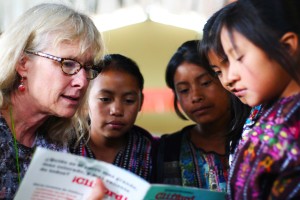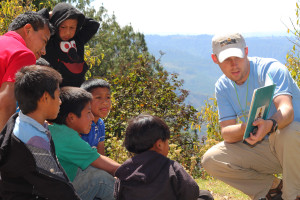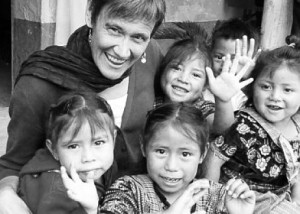This is the second article in a series by Linda Smith, Founder & Executive Director of Reading Village, about the softer side of community development, where she shares the power of relationships and surprises in her international development work.
In 1980, as a high school sophomore in southern California, I spent spring break on a service learning trip in Tijuana, Mexico. Along with 50 other youth, I spent the week laying bricks, pouring concrete flooring and putting up the roof of what would be a drug rehabilitation center. We worked side by side with local community members and through broken high school Spanish, pantomimes, and smiles, we built relationships. At the end of that long week filled with bologna sandwiches, sweat and laughter we completed the structure, proud of what we had accomplished together.
Crossing the border on the way home I found myself in turmoil as we moved from the pitch black darkness behind us into the glare of city lights in San Diego. All the Mexican people I have come to care about had so little, I thought to myself, and I have so much. There was nothing profound about this realization, but it weighed heavier than the bricks I had lifted. I knew then, more acutely than ever before, that I had done nothing to deserve what I had; it was just random luck that I happened to be born here.
That moment, those lights, that was the birth of my social consciousness.
Decades later, as a social entrepreneur working in Guatemala I have seen the good, the bad and the ugly of these well-intentioned efforts to make a difference in the lives of others. I have seen my share of empty buildings that were once libraries or schools and innovative cook stoves that serve as coat racks. As it turns out, physical labor and materials are often more readily available than the ability to maintain the structure or the desire to use it.
I know now that the more sustainable investment is in human capital rather than in physical capital. If you invest in the development of individuals, a community will figure out how to build its own library.
Reading Village, the organization I founded, operates on this principle. We don’t bring volunteers to Guatemala to build libraries. The Mayan youth who have flourished in our leadership development program have already done that! Instead we host annual Learning Journeys, a form of experiential philanthropy in which small groups of travelers have the opportunity to see firsthand the impact that can be made when you empower communities to create their own change.
As a Learning Journey participant you have the opportunity to get off the tourist path, to really connect with amazing youth, experience their daily lives and Mayan traditions, and witness the power of literacy at work. Not only is this fun for everyone involved, the experience is as meaningful for the youth leaders as it is for the travelers. These teens can hardly believe that, when in their own country where they are hemmed in by walls of discrimination due to their indigenous heritage, someone would come from thousands of miles away just to meet them, to take an interest in their literacy work and to appreciate their culture –to appreciate them for who they are.
These connections changes lives – yours and theirs.
This messy work of showing up and bearing witness to one another’s struggles and successes, recognizing one another’s dignity as well as their imperfections, this is so much powerful than any construction project.
We’re not building any brick walls through our Learning Journeys, in fact we’re doing just the opposite. We’re working very hard to tear them down.
Linda Smith has a background in education, public health, business, solar energy, and community sustainability, both in the corporate and nonprofit worlds. She has been connected to Guatemala since 1988. She earned an MBA and MA in Latin American Studies from UCLA, is fluent in Spanish and is learning Kaqchikel. Today, Linda is the Founder & Executive Director of Reading Village (www.readingvillage.org)



